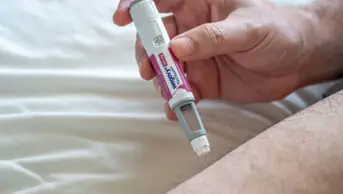
Shutterstock.com
Clinical research has been in the headlines: with Nobel Prize winners, The Pharmaceutical Journal’s deep dive on weight-loss medication innovation, a new chief scientist at the RPS, the Medicines and Healthcare products Regulatory Agency speeding up clinical trials and concerns around the relationship between NHS drug prices and investment in Britain’s life sciences research.
What will new drug discovery research mean for pharmacists?
Research advances could open new doors for drug discovery and pharmaceutical interventions.
A proof-of-principle study, published in Nature Chemical Biology, demonstrated how “smart” protein tails that fold themselves into preprogrammed shapes and respond to a combination of biomarker cues could be used to deliver drugs to targeted areas of the body — and could be manufactured within days.
Findings from early studies at Washington University School of Medicine in St Louis, United States, suggest gene-editing treatments could stop rotavirus infecting cells — and could be replicated by drugs that do the same.
Researchers from New York University published findings on a pain signalling receptor, protease-activated receptor-2 (PAR2), which is activated by gut enzyme proteases, and can be blocked by nanoparticles, potentially leading to future gut pain relief treatments.
Meanwhile, an experimental study from the University of Victoria, Canada, suggests that injecting a glycoprotein, Reelin, could restore a “leaky” gut barrier and prevent major depressive disorder.
Hormone replacement therapy (HRT) has been shown to benefit menopausal women beyond managing symptoms, with a reversal of immune system decline demonstrated in a study published in Aging Cell this week.
Results of a phase 2/3 superiority trial, published in The Lancet, showed ibrutinib with rituximab provided superior progression free survival compared with rituximab and immunochemotherapy in patients with untreated mantle-cell lymphoma.
Meanwhile, a study presented at the American College of Surgeons’ Conference (4–7 October 2025, Chicago, Illinois) found that in cancer patients with depression who underwent surgery, treatment with antidepressants improved recovery, reduced hospital stay and readmission and contributed to lower rates of mortality.
Further reading
Pharmacists’ skills are needed in every area of healthcare
With increased drug use comes an increased need for medicines knowledge across every clinical area.
A US study that found a nearly 60% increase in drug-related unintentional injury from 2018 to 2023, suggested medical responses to traumatic injuries needed to consider whether drug use was involved, and treat the patient accordingly.
Another study of more than 300 million patient records in the United States showed GLP-1 use before bariatric surgery increased sixteen-fold between 2020 and 2024. Lead author Stefanie C Rohde, commented: “While patients previously believed they had to choose between GLP-1 receptor agonists and surgery, we’re now seeing that people are using both… but all of this is still very new in terms of how to manage patients effectively.” Meanwhile, GLP1-RAs have been shown to cause several atypical patterns of tracer uptake in oncologic FDG PET-CT scans that could be misinterpreted as pathology if a patient’s medication history is not considered, research presented at the 38th Annual Congress of the European Association of Nuclear Medicine revealed.
Alongside medicines expertise, pharmacists need interpersonal skills to support shared decision making. For instance, some patients choose to take oestrogen-based hormone therapy in menopause after having breast cancer, accepting an increased risk of relapse in exchange for relief from menopausal symptoms and an improved quality of life. Writing in Menopause, researchers have suggested how shared decision making could consider individual circumstances and the absolute risk of relapse. They also recommended that women choosing to take menopausal hormone therapy after breast cancer be enrolled in a relevant clinical study.
Further reading
Enablers must support pharmacists to work at the top of their skillset
Pharmacists must be enabled to use their skills effectively. The Pharmaceutical Journal‘s news coverage suggests that pharmacists are not being given the opportunity to do as much as they could in patient care, with less than half those holding an independent prescribing qualification using it daily, low take-up of ambulatory blood pressure monitoring in community pharmacy, and limited commissioning of interventions such as COVID-19 vaccinations.
Further reading
- Expanding community pharmacy services could save NHS almost £4bn
- Is a lack of protected learning time holding back hospital pharmacists’ career development?
- The NHS ten-year plan: what does it mean for community pharmacy?
- Redefining the pharmacist of the future
- PJ view: We cannot expect pharmacists to develop their skills on goodwill alone


